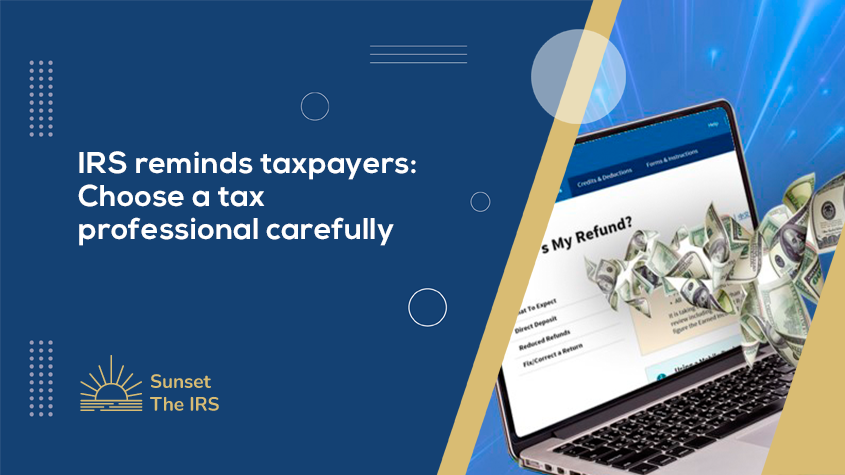
The Tax Agency today reminded taxpayers to choose a tax return writer carefully. While most tax preparers provide quality and honest service, some can cause harm through fraud, identity theft, and other scams.
When hiring a person or company to prepare a tax return, taxpayers need to understand who they are choosing and what important questions to ask.
A taxpayer's needs will determine what type of preparer is best for him. Whether taxpayers regularly use a tax professional to help them file a tax return or are deciding to work with one for the first time, it's important to choose a tax professional carefully. Taxpayers are ultimately responsible for all information on their tax return, regardless of who files the return.
When choosing a tax professional, the IRS encourages taxpayers to visit IRS.gov. The Choose a Tax Professional page contains information about the tax preparer's credentials and qualifications . The IRS List of Federal Tax Return Preparers with Selected Credentials and Qualifications can help identify many preparers by type of credential or qualification.
Warning signs
By law, anyone who is paid to prepare or assist in the preparation of federal tax returns must have a valid tax preparer identification number . Paid preparers must sign and include their PTIN on any tax return they prepare.
Failing to sign for a return is a red flag that the paid preparer may be looking to make a quick profit by promising a large refund or charging fees based on the amount of the refund. Taxpayers should avoid these unethical "ghost" tax preparers.
A ghost preparer is someone who does not sign the tax returns they prepare. Unscrupulous ghost preparers often print the return and have the taxpayer sign and mail it to the IRS. For electronically filed returns, a ghost preparer will prepare the tax return but will refuse to digitally sign it like a paid preparer.
Tips for Selecting a Tax Return Preparer
Here are some tips to keep in mind when choosing a tax preparer:
- Look for a coach available year-round. If questions arise about a tax return, taxpayers may need to contact the preparer after filing season is over.
- Review the history of the preparer. Visit the Better Business Bureau website for preparer information. Look up disciplinary actions and license status for accredited trainers. For CPAs, check the State Board of Accountants website, and for attorneys, check with the state bar association. For registered agents, go to Check the status of a registered agent or check the IRS list of federal tax return preparers .
- Ask about service charges. Taxpayers should avoid tax preparers who base their fees on a percentage of the refund or who offer to deposit all or part of the refund into their financial accounts. Beware of tax preparers who claim they can get you bigger refunds than their competitors.
- Make sure your preparer offers the IRS electronic file. The IRS issues most refunds in less than 21 days for taxpayers who file electronically and choose direct deposit .
- Provide documents and receipts. Good preparers ask to see these documents. They will also ask questions to determine the client's total income, deductions, tax credits, and other items. Do not hire a preparer to file an income tax return electronically using a pay stub instead of a W-2 form. This is against the IRS electronic filing rules.
- Understand the trainer's credentials and qualifications. Attorneys, CPAs, and Enrolled Agents can represent any client before the IRS in any situation. Participants in the Annual Filing Season program can represent taxpayers in limited situations if they have prepared and signed a tax return.
- Never sign for a blank or incomplete return. Taxpayers are responsible for filing a complete and correct tax return.
- Check your tax return before signing it. Be sure to ask questions if something is unclear or seems wrong. Any refund must go directly to the taxpayer, not to the preparer's bank account. Review the routing and bank account number on the completed statement and make sure it is correct.


